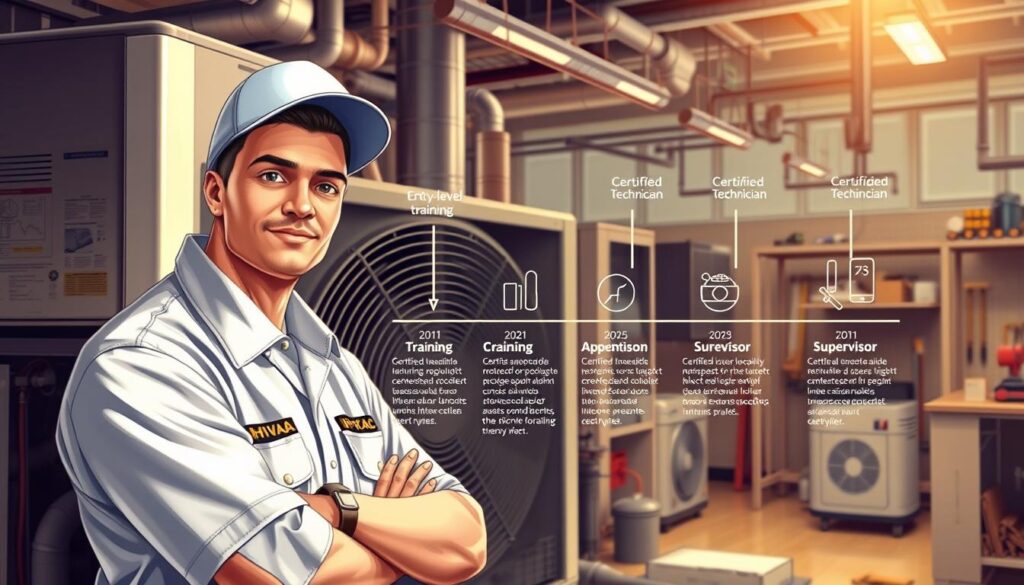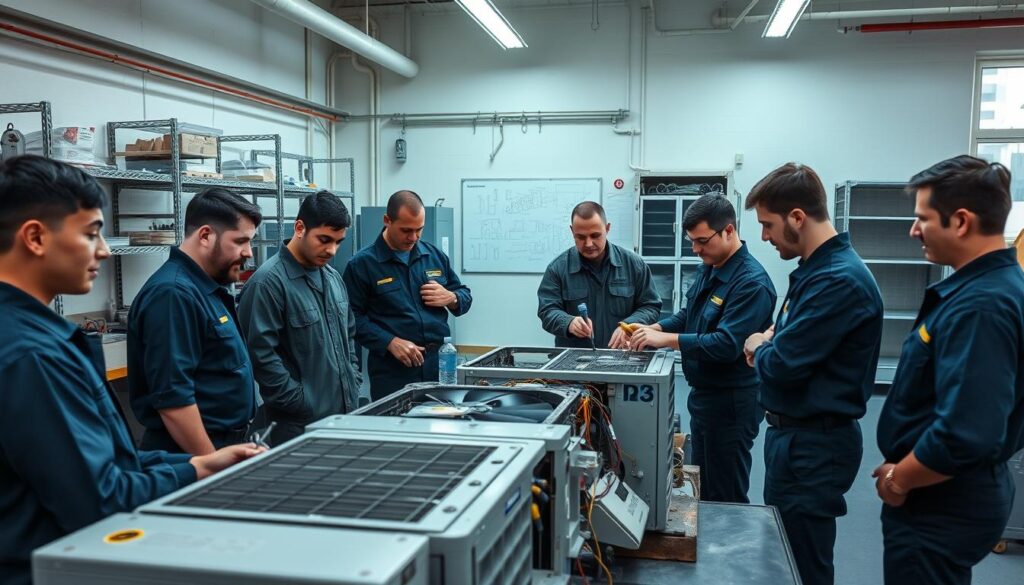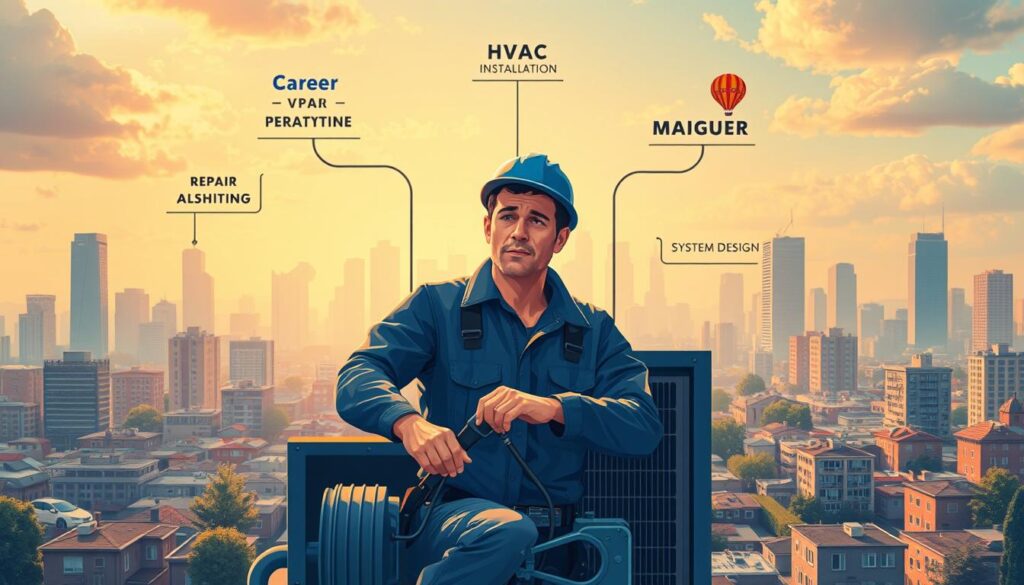Affiliate Disclosure
HVAC Guide Guys is a participant in the Amazon Services LLC Associates Program, an affiliate advertising program designed to provide a means for sites to earn advertising fees by advertising and linking to Amazon.
How Fast Can I Become an HVAC Technician? Are you curious about turning your passion into a rewarding HVAC career? Becoming an HVAC technician can be quicker and more exciting than you think.

The job market is changing fast, and HVAC careers are a great choice for a stable job. With the right training and effort, you could start your HVAC career in under a year. This opens doors to a field with strong growth and good job chances.
Vocational schools like South Texas Vocational Technical Institute (STVT) offer fast programs. They help you become an HVAC technician in a short time. It’s important to know the different training options and pick the one that fits your goals and learning style.
Key Takeaways
- HVAC technician training can be completed in as little as 9 months
- Multiple educational pathways exist, including vocational schools and apprenticeships
- Job outlook for HVAC technicians is strong, with 15% expected growth
- Certification and hands-on training are key for success
- How fast you learn depends on your dedication
Table of Contents
Understanding the HVAC Technician Career Path
Starting a career as an HVAC technician is exciting. It leads to a world of dynamic and essential work. You’ll learn important technical skills and handle many tasks to keep places comfortable.
Key Responsibilities and Daily Tasks
HVAC technicians are key in installing, fixing, and keeping systems running. Your day might include:
- Reading and understanding technical plans
- Finding and fixing system problems
- Setting up and checking HVAC equipment
- Doing regular maintenance
- Keeping systems energy-efficient
Industry Overview and Career Prospects
HVAC job prospects are very good. The field is expected to grow by 9% from 2023 to 2033. This growth means lots of chances for skilled workers. The need for energy-saving systems is also creating more jobs.
| Career Metric | Current Statistics |
|---|---|
| Total Current Jobs | 441,200 |
| Projected Job Growth | 9% (2023-2033) |
| Projected New Jobs | 40,100 |
| Median Annual Wage | $48,060 |
Essential HVAC Technician Skills
To do well, you need technical skills and soft skills. Your skills should include:
- Being good at solving problems
- Understanding mechanics
- Being physically strong
- Being good with customers
- Knowing a lot about complex systems
“The future of HVAC is not just about fixing machines, but about creating efficient, sustainable comfort solutions.” – Industry Expert
Keeping up with new tech is vital for success in this field.
How Fast Can I Become an HVAC Technician
Wondering how fast you can become an HVAC technician? You have several ways to start this exciting career. The time it takes to become an HVAC pro depends on your training choice and how hard you work.
Accelerated HVAC courses are the quickest way in. You can finish these in 6 to 9 months. This means you can start your new job sooner. Here are the main training options:
- Certificate Programs: 6-12 months
- Associate Degree: 2 years
- Apprenticeship: 2-5 years
How quickly you become an HVAC technician depends on a few things:
- Your current education level
- Training programs near you
- How much money you have
- How fast you learn
“The key to success in HVAC is not just how fast you can complete training, but how well you learn and apply your skills.” – HVAC Industry Expert
Certification rules can also affect your timeline. Most states need you to pass a test after you finish your training.
| Training Path | Duration | Estimated Cost |
|---|---|---|
| Certificate Program | 6-12 months | $1,200 – $5,000 |
| Associate Degree | 2 years | $5,000 – $15,000 |
| Apprenticeship | 2-5 years | Paid on-the-job training |
The Bureau of Labor Statistics says there will be a 5% job growth for HVAC techs by 2031. This is a great time to start your HVAC training and start your career fast.
Explore Our HVAC Shop
Looking for top-rated HVAC tools, parts, and accessories? Visit our shop and find the perfect solution for your needs.
Visit the ShopEducational Requirements and Prerequisites
To start a career in HVAC, you need a strong educational base. You’ll learn about the essential steps and paths to success in HVAC training programs.
High School Diploma or GED: Your First Step
A high school diploma or GED is the first step for HVAC techs. Most employers and training programs need this basic education. Your high school studies can greatly help your HVAC skills.
Recommended High School Courses
To prepare for your HVAC career, focus on these subjects:
- Physics: It helps you understand thermal dynamics and energy.
- Mathematics: It’s key for technical calculations and solving problems.
- Computer Science: It’s vital for modern HVAC technology.
- Shop Classes: They help you develop mechanical skills.
Essential Technical Skills for HVAC Success
Having specific technical skills can make you stand out in HVAC training. Mechanical aptitude is very important, including:
- Being good with hand and power tools.
- Knowing basic electrical stuff.
- Understanding mechanical systems.
- Having strong spatial reasoning.
“The right education is your passport to a successful HVAC career.” – Industry Expert
With HVAC tech jobs growing by 13%, and new jobs expected to be around 46,300, getting a good education now can lead to a bright future in this field.
Different Training Pathways Available
Looking into hvac training programs opens up several paths to start your HVAC career. Each path has its own benefits for those wanting to join this exciting field.
Here are your main choices for HVAC training:
- Vocational School Programs
- Community College Certificates
- Apprenticeship Programs
- Technical Institute Training
Vocational schools offer a structured way to learn HVAC. These programs last from 6 months to 1 year. They give you both technical knowledge and practical skills.
“Training is the bridge between your current skills and your future success in the HVAC industry.” – Industry Expert
Now, let’s look at what each training path offers:
| Training Pathway | Duration | Average Cost | Key Benefits |
|---|---|---|---|
| Vocational School | 6-12 months | $3,000-$20,000 | Structured curriculum, hands-on training |
| Community College | 1-2 years | $7,500 average | Associate degree, broader education |
| Apprenticeship | 3-5 years | Minimal direct cost | Paid on-the-job training, mentorship |
Pro Tip: Think about your learning style, budget, and career goals when picking an HVAC training path. Each option has its own benefits for entering this growing industry.
Explore Our HVAC Shop
Looking for top-rated HVAC tools, parts, and accessories? Visit our shop and find the perfect solution for your needs.
Visit the ShopVocational School Programs and Duration
Choosing the right hvac training programs can speed up your journey to becoming an HVAC technician. Vocational schools mix theory with hands-on skills. This prepares you for a career in the HVAC field.
Course Content and Curriculum
Accelerated hvac courses cover key topics:
- Refrigeration mechanics
- Air conditioning systems
- Electrical control fundamentals
- HVAC system design
- Energy efficiency principles
Hands-on Training Components
The best vocational programs focus on practical skills. Students get:
- Lab-based technical training
- Equipment installation practices
- Diagnostic skill development
- Troubleshooting real-world scenarios
Program Length Options
HVAC training programs come in flexible lengths:
| Program Type | Duration | Typical Focus |
|---|---|---|
| Accelerated Courses | 6-12 months | Quick entry-level skills |
| Comprehensive Programs | 18-24 months | In-depth technical knowledge |
“Invest in your education today to build a robust HVAC career tomorrow.” – HVAC Industry Expert
Your choice of program depends on your goals, time, and learning style. Choose a program that balances theory and practical training well..
HVAC Apprenticeship Programs

HVAC apprenticeships are a great way to start your career in heating, ventilation, and air conditioning. These programs mix hands-on experience with classroom learning. They prepare you for a successful career in the technical field.
An HVAC apprenticeship lasts 3-5 years. You’ll get on-the-job training and classroom lessons. You’ll learn valuable skills and earn a good salary while you work.
“An apprenticeship is not just a job – it’s a complete learning experience that boosts your career chances.”
- Total training hours: About 8,280 hours of practical experience
- Classroom instruction: 720 hours of HVAC training
- Exam requirements: Three levels of professional assessments
- Minimum passing grade: 70% on the final exam
Most HVAC companies look for people who are eager to learn and have strong technical skills. While pre-apprenticeship programs can help, they’re not always needed to get an apprenticeship.
Key benefits of HVAC apprenticeships include:
- Earn while you learn
- Get real-world experience
- Get structured mentorship
- Build a professional network
Hiring in the HVAC field often picks up in February to April. This is to get ready for the summer. By choosing an apprenticeship, you’re setting yourself up for a stable and rewarding career with lots of room to grow.
Certification and Licensing Requirements
Getting into the HVAC world means knowing the rules and standards. You need to understand the key certifications that prove you’re skilled.
The rules for HVAC certifications vary by state and area. It’s important to grasp these details for your career.
State-Specific Licensing Guidelines
HVAC licenses change from state to state. Here are some things to keep in mind:
- Most states need 12 months of field experience
- Written tests are common
- Places like New York, Indiana, and Colorado have their own rules
Industry Standard Certifications
There are key certifications that shape the HVAC field and show your skills:
| Certification | Focus Area | Significance |
|---|---|---|
| EPA Section 608 | Refrigerant Handling | Mandatory for all technicians |
| NATE Certification | Technical Expertise | Validates real-world working knowledge |
| Refrigerant Classifications | Specialized Systems | Type I, II, III Certifications |
Pro tip: Keep learning and stay up-to-date with new HVAC tech. It will help your certifications and career.
“Certification is not just a piece of paper, but a testament to your professional commitment and expertise.” – HVAC Industry Expert
Fastest Route to Becoming an HVAC Professional
Wondering how fast you can become an HVAC technician? The answer is quick. You can start your career in just 11 months with focused training. Accelerated HVAC courses are the fastest way to get into this exciting field.
The quickest path to becoming an HVAC pro includes:
- Completing a vocational school program (6-9 months)
- Getting the needed certifications
- Getting your first hands-on experience
“Speed doesn’t compromise quality when you choose the right training program.” – HVAC Industry Expert
To speed up your HVAC technician path, try these tips:
- Choose intensive training programs that pack learning into shorter times
- Get EPA Section 608 certification early
- Use part-time or apprenticeship chances
| Training Option | Duration | Certification |
|---|---|---|
| Vocational School | 6-9 months | EPA Section 608 |
| Apprenticeship | 3-5 years | Journeyman License |
While fast HVAC courses get you in the field quickly, keep learning and improving. This is key for success in this changing industry.
Explore Our HVAC Shop
Looking for top-rated HVAC tools, parts, and accessories? Visit our shop and find the perfect solution for your needs.
Visit the ShopCareer Advancement Opportunities

The HVAC industry is full of exciting career paths for those who are motivated. Your journey can go beyond just being an entry-level technician. There are many chances to grow and specialize.
As you get better at working with HVAC systems, you’ll find different ways to move up:
- Supervisory Positions
- Field Service Supervisor
- Project Manager
- Shop Foreman
- Specialized Technical Roles
- Energy Efficiency Specialist
- Indoor Air Quality Inspector
- Green Technology Consultant
- Entrepreneurial Opportunities
- Starting Your Own HVAC Business
- Consulting Services
- Equipment Design and Manufacturing
Right now, the HVAC industry is growing fast. The U.S. Bureau of Labor Statistics says there will be a 13% increase in HVAC technician jobs from 2018 to 2028. This is much faster than the average for all jobs.
“Continuous learning and skill development are key to advancing in the HVAC industry.”
To really move up in your career, think about:
- Getting more certifications
- Specializing in new technologies
- Improving your project management skills
- Keeping up with the latest in the industry
New areas like smart home systems, green HVAC solutions, and energy-saving tech are great for ambitious people.
| Career Level | Potential Roles | Estimated Growth |
|---|---|---|
| Entry-Level | HVAC Technician | 13% (2018-2028) |
| Mid-Level | Project Manager | 7-10% annual increase |
| Advanced | Energy Systems Engineer | 15-20% possible growth |
Your HVAC career can be as dynamic and innovative as the technologies you’ll work with.
Explore Our HVAC Shop
Looking for top-rated HVAC tools, parts, and accessories? Visit our shop and find the perfect solution for your needs.
Visit the ShopSalary Expectations and Job Market Outlook
Thinking about becoming an HVAC technician? It’s important to know what you can earn. The HVAC field is growing, with good pay and chances to advance.
Let’s look at what HVAC technicians can earn at different stages of their career:
Entry-Level Salary Range
Starting out, your salary will be based on your skills. The lowest 10% of HVAC technicians make about $36,170 a year. This is a good start for your career.
Experience-Based Compensation
As you get better, your salary will go up. Here’s what you might earn:
- Median annual wage: $51,390
- Top 10% of professionals: Up to $82,630
- Apprentices: About 50% of experienced technician wages
Your salary can also depend on the industry you work in:
| Industry | Median Annual Wage |
|---|---|
| Wholesale Trade | $57,760 |
| Educational Services | $54,950 |
| Plumbing & HVAC Contractors | $49,630 |
“The HVAC field offers not just a job, but a career with substantial growth.” – Industry Expert
The job outlook for HVAC technicians is good. The Bureau of Labor Statistics says there will be a 6% growth in jobs from 2022-2032. This means about 37,700 new jobs every year. Texas and New York are great places to find work, with growth rates of 21% and 20% respectively.
Tools and Technology in Modern HVAC
The HVAC industry is changing fast, thanks to new technologies. These changes are making HVAC work more advanced. If you want to be an HVAC pro, you need to know about the latest tools and tech.
HVAC tech skills have grown a lot. Now, HVAC pros need to know about advanced tools and digital tech. These tools are changing the HVAC world.
- Digital multimeters for precise electrical measurements
- Smart thermostats with advanced connectivity
- Infrared thermal imaging cameras
- IoT-enabled energy management systems
The HVAC industry is moving towards digital tools. HVAC pros use special software and apps for:
- Diagnosing system performance
- Tracking maintenance schedules
- Analyzing energy use
- Reporting to clients in real-time
“Technology is transforming HVAC from a purely mechanical trade to a sophisticated technological profession.” – HVAC Industry Expert
New tech like building automation and predictive maintenance is opening up new chances. These chances are for those who can keep learning and adapting.
Conclusion
Exploring how fast you can become an HVAC technician is exciting. Your path is unique, and HVAC careers offer quick entry into a rewarding field. Training can take as little as 6 months, or up to 5 years through apprenticeships.
The HVAC industry is booming, with job security and growth. Technicians earn a mean annual wage of $47,380. With a 14% job growth rate by 2024, there’s a high demand for skilled workers.
Your success in HVAC depends on the right training and staying updated. Whether you choose a vocational school or an apprenticeship, you’ll find a field with good pay and career growth.
Investing in your HVAC education sets you up for a stable, lucrative career. The industry is eager for motivated individuals. It’s a key profession for keeping indoor spaces comfortable and healthy across the U.S.

